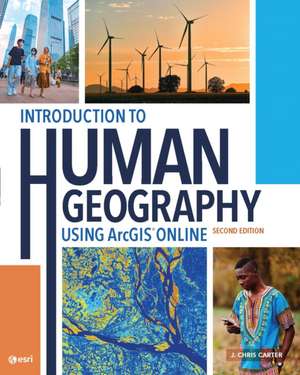Introduction to Human Geography Using ArcGIS Online
Autor J Chris Carteren Limba Engleză Paperback – 5 sep 2023
The essential concepts and theories of human geography are brought to life thanks to the innovative integration of web maps.
Introduction to Human Geography Using ArcGIS Online, second edition, explains topics such as migration, race and ethnicity, food and agriculture, manufacturing and services, urban geography, and cultural geography using ArcGIS® Online. ArcGIS Online is a browser-based geographic information system (GIS) that allows users to explore and analyze thousands of geographic datasets and interactive maps.
This second edition features updated maps, figures, and charts reflecting the latest data and includes new text on contemporary issues, from race, ethnicity, and political geography to pollution and climate change.
Designed for undergraduate college and AP high school students, Introduction to Human Geography Using ArcGIS Online, second edition, uses the latest geospatial data and web-based technology to teach critical thinking and evaluate the diversity of people within their environments and their impact on our planet.
J. Chris Carter is a Professor of Geography at Long Beach City College. He has more than 20 years of experience teaching human geography and GIS, as well as courses on world regional geography and economic geography. He earned his PhD in Geography from San Diego State University/University of California, Santa Barbara.
Preț: 547.30 lei
Preț vechi: 643.88 lei
-15% Nou
Puncte Express: 821
Preț estimativ în valută:
104.73€ • 111.99$ • 87.32£
104.73€ • 111.99$ • 87.32£
Carte disponibilă
Livrare economică 27 martie-10 aprilie
Preluare comenzi: 021 569.72.76
Specificații
ISBN-13: 9781589487468
ISBN-10: 158948746X
Pagini: 384
Dimensiuni: 201 x 253 x 21 mm
Greutate: 1.07 kg
Ediția:Nouă
Editura: Esri Press
ISBN-10: 158948746X
Pagini: 384
Dimensiuni: 201 x 253 x 21 mm
Greutate: 1.07 kg
Ediția:Nouă
Editura: Esri Press
Cuprins
Preface
Acknowledgments
Chapter 1 Introduction
Chapter 2 Populations
Chapter 3 Migration
Chapter 4 Race and ethnicity
Chapter 5 Urban geography
Chapter 6 Food and agriculture
Chapter 7 Manufacturing
Chapter 8 Services
Chapter 9 Development
Chapter 10 Culturual geography -- folk and popular culture, language, religion
Chapter 11 Political geography
Chapter 12 Climate change
Index
Acknowledgments
Chapter 1 Introduction
Chapter 2 Populations
Chapter 3 Migration
Chapter 4 Race and ethnicity
Chapter 5 Urban geography
Chapter 6 Food and agriculture
Chapter 7 Manufacturing
Chapter 8 Services
Chapter 9 Development
Chapter 10 Culturual geography -- folk and popular culture, language, religion
Chapter 11 Political geography
Chapter 12 Climate change
Index
